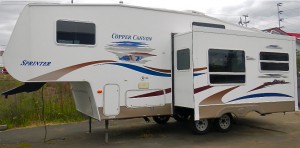Recently Sarah and I have been discussing the value of a recreational vehicle as a portable Bug-Out Location (BOL).
Some background: In the future (probably two to five years) we hope to get a five to ten-acre homestead in rural Western Washington. For now, because of family, finances, and life circumstances we live in a suburban neighborhood.
 Risk assessment of the area we live: In the prepper world there’s the discussion of when and why you’d bug-out or bug-in in a disaster. Each family needs to assess the risks/perils of the area they live in. Our house is in a relatively safe location: no risk of floods or landslides, earthquake damage would be negligible, too far from the coast to be affected by tsunamis, we don’t get tornadoes, forest fire risk is low and wouldn’t reach us, we’re far from urban populations and their potential civil unrest, and it never really gets too hot or too cold here. Although Mount Rainier is an active volcano, as of 2010 there was “no evidence of an imminent eruption“. Sure an eruption would be a huge deal, but even if it did erupt we’re not in a bad location: we live on a hill top community any lahars would be channeled through the valleys around us, and most of the ash would typically be blown south with the prevailing winds (we live north). Our only real complaint about our current location is the small size of our property, and the density of the neighborhood population; we’ve worked hard to get as prepared as we can here, carefully using the space and resources available. In summary, we feel that–short of a complete collapse–we could stay here.
Risk assessment of the area we live: In the prepper world there’s the discussion of when and why you’d bug-out or bug-in in a disaster. Each family needs to assess the risks/perils of the area they live in. Our house is in a relatively safe location: no risk of floods or landslides, earthquake damage would be negligible, too far from the coast to be affected by tsunamis, we don’t get tornadoes, forest fire risk is low and wouldn’t reach us, we’re far from urban populations and their potential civil unrest, and it never really gets too hot or too cold here. Although Mount Rainier is an active volcano, as of 2010 there was “no evidence of an imminent eruption“. Sure an eruption would be a huge deal, but even if it did erupt we’re not in a bad location: we live on a hill top community any lahars would be channeled through the valleys around us, and most of the ash would typically be blown south with the prevailing winds (we live north). Our only real complaint about our current location is the small size of our property, and the density of the neighborhood population; we’ve worked hard to get as prepared as we can here, carefully using the space and resources available. In summary, we feel that–short of a complete collapse–we could stay here.
If there was a complete collapse where would we go?: At this point, probably to nearby family or friend’s home. That’s where the RV idea comes in. If we did have to go somewhere it would be a better situation if we had our own living space; very few homes have enough room for six additional people.
 There are basically two major classes of RVs: There are motor homes (the kind where the vehicle is part of the unit) and travel trailers (the kind that are towed behind a vehicle). Both are available, in decent condition, for under $10,000 (used). After weighing the pros and cons we’d go with the travel trailer option and get a medium to large 5th wheel trailer. Having decided on a 5th wheel trailer means we’d have to have a vehicle capable of towing it. We don’t have one yet, but are actively searching for a 3/4 to 1-ton diesel truck so hopefully that won’t be an issue soon.
There are basically two major classes of RVs: There are motor homes (the kind where the vehicle is part of the unit) and travel trailers (the kind that are towed behind a vehicle). Both are available, in decent condition, for under $10,000 (used). After weighing the pros and cons we’d go with the travel trailer option and get a medium to large 5th wheel trailer. Having decided on a 5th wheel trailer means we’d have to have a vehicle capable of towing it. We don’t have one yet, but are actively searching for a 3/4 to 1-ton diesel truck so hopefully that won’t be an issue soon.
Advantages: While $10,000 is a lot, it’s not bad when compared to $100,000 to $200,000 for a true homestead/BOL. It gives you the flexibility of where you go in a disaster; what if your BOL isn’t an option? It also allows you to use it for camping or road trips (and you should, at least for practice), so it’s not like it’s useful only if the world collapses. Plus it could be pre-stocked with additional preps and keep in a secure off-site location — so if something did happen to our home we wouldn’t lose everything (repetitive and redundant).
Another thought is that it could be used during a pandemic as a quarantine area. Whether that means pulling it in front of our home, or on our future homestead.
Review the risks at your location, and your BOL options; a mobile BOL can be a good, flexible, in-between option.
(Friday: What We Did This Week To Prep)


